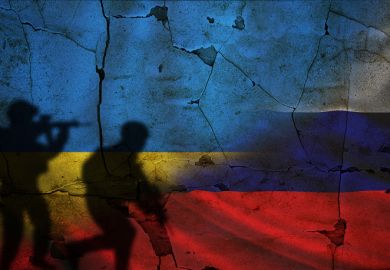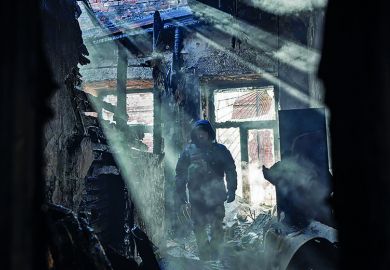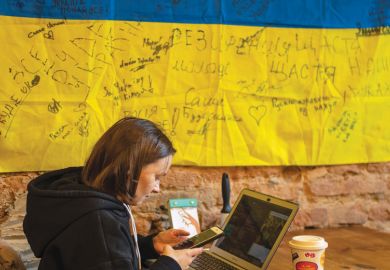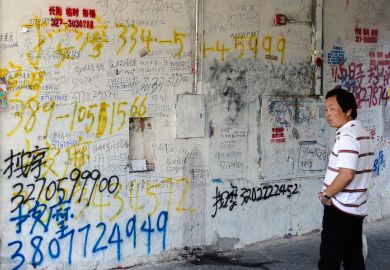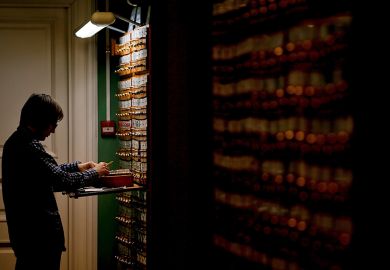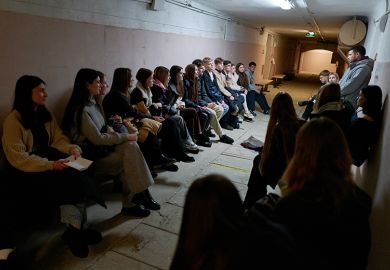As the war in Ukraine enters its 10th month, many academics from the country find themselves displaced abroad this winter, long after they thought they would be back at home.
A small number of them are in the UK, finding their feet again, navigating new institutions and a new country, with the support of the Council for At-Risk Academics (Cara).
One, Igor Kotsuiba, speaking from his current base at Durham University, was upbeat, describing his “soft landing” in the UK, where he arrived in early March, shortly after Russia invaded his country.
Before the war, Dr Kotsuiba was living in Bucha – a town outside Kyiv that suffered heavy damage early in Russia’s invasion. A guest lecturer at European universities, he was leading a business, managing Horizon 2020 projects and supervising PhD students in cybersecurity.
THE Campus resource: Supporting Ukrainian scholars - what’s next for #ScienceForUkraine?
While he did not want to dwell on the circumstances of his hurried departure from his country or on the tragedy caused by the Russian invasion, Dr Kotsuiba said that in those first days in the UK, the community in Durham gave him “an extremely warm reception”.
A single father, Dr Kotsuiba’s first priority was finding nursery and school places for his daughters, aged three and nine, which he did the day after he arrived in the UK. Soon after, the girls were signed up to dance classes and the science club.
“The idea was to try to restore their daily routine as quickly as possible…We underestimate the maturity of kids, but they understand everything. It’s very important for them as well as for myself to be perceived and welcomed in the community as a full member, and I felt this instantly,” he said.
He had high praise for his new academic home, where he is doing research in risk and resilience in conventional and unconventional warfare – all “very connected” to the situation in Ukraine. In his spare time, Dr Kotsuiba aims to foster a sense of community for others who have left Ukraine, arranging weekend get-togethers so the children can play and speak their native language.
Beyond his efforts to help rebuild in a new place, he also hopes to create research links with his UK colleagues that can lay the groundwork for future collaborations that can ramp up when the war ends.
“The future of Ukrainian academia is based on the intellectual merits we’ve got,” he said.
It has been a bumpier road for Anna Yatsyshyna, now a visiting research fellow at the Open University living near Milton Keynes. At the time of the invasion, she lived with her husband and her young son near Irpin, in the suburbs to the west of Kyiv, which came under heavy shelling early in the war.
“For about two weeks, it was like [the] end of life. We couldn’t go outside – we just lived in a small corridor,” she said.
Finding someone to take the family out of danger was near impossible, and staying was not an option. She and her family relied on strangers’ help to make the four-day journey from Ukraine to the Polish border. The escape was fraught, with shells exploding nearby and “no petrol, traffic jams and no food”. But she recalls the “many kind people” who helped, with some making an open fire in the forest and boiling water for tea.
While it brought safety, her arrival in Poland came with other difficulties, including the language barrier. With her knowledge of English, Dr Yatsyshyna knew she would have better luck finding work in the UK. In early May, the family entered the country on the Homes for Ukraine scheme. Not long after, she applied for the Cara fellowship. A month and a half later, she learned that she had secured funding.
Since then, she has joined the cancer cluster of her university, where she is looking into the radio resistance of cancer cells. She joked about how chatty British scientists are compared even with their Ukrainian counterparts, who felt like a “big family”.
In other ways, though, normality has been more difficult to recover. Her son, now two and a half, is still wary of going outside and has trouble sleeping. He has also gone silent.
Dr Yatsyshyna and her husband were very lucky with their host family, who let them stay for longer until they could find more permanent accommodation. But they are still struggling to find a place that they can rent.
Amid all this tumult, she acknowledged, work brings her solace. Being able to research helps her to turn her mind to things other than war.
“When we came to UK, it’s like everything was new…When I finally got this fellowship, I could go to university, meet new colleagues…switching my attention from stressful questions,” she said.
She wanted other academics to know that they, too, could find support that helps them to secure a position that suits them exactly. She credited Cara with trying to find “a perfect place” for her to continue her research.
“It’s not just a place to stay during the war – it’s trying to get involved in different processes and having opportunities to grow,” she said.
But even the blessings of being able to continue her work and finding security for her family are bittersweet, according to Dr Yatsyshyna. Her mother remains at home and winter is setting in, amid widespread power shortages.
“In November, I wasn’t planning to be so far from my house…I feel guilty. I can do what I love to do. I can work and have access to normal life – at the same time when millions in Ukraine still suffer.”
pola.lem@timeshighereducation.com
To support Cara, visit www.cara.ngo/10-x-20-appeal
POSTSCRIPT:
Print headline: ‘It’s not just a place to stay during war’
Register to continue
Why register?
- Registration is free and only takes a moment
- Once registered, you can read 3 articles a month
- Sign up for our newsletter
Subscribe
Or subscribe for unlimited access to:
- Unlimited access to news, views, insights & reviews
- Digital editions
- Digital access to THE’s university and college rankings analysis
Already registered or a current subscriber?

